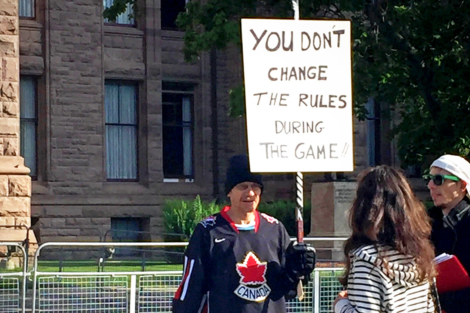The Ontario legislature descended into chaos on September 12 after members of the opposition and the public spoke out against Premier Doug Ford’s decision to invoke Section 33 of the Canadian Charter, also known as the notwithstanding clause. This landmark decision comes after a Superior Court ruling struck down Bill 5 on September 10, which would have downsized Toronto City Council from 47 to 25 seats. The invocation of the notwithstanding clause by the government overrules the court decision, and allows Ford to continue with his plan to cut down city council. The provincial government is also appealing the Superior Court ruling.
Ford will be the first Ontario Premier to invoke Section 33 of the Canadian Charter of Rights and Freedoms in the province’s legislative history. This section of the Charter allows the federal or provincial government to override certain sections of the Charter; in this case, Ford is using it to bypass the court ruling. Most instances of its enactment were in Québec as a form of protest.
Ford made the sudden announcement to use the notwithstanding clause hours after Ontario Superior Court Justice Edward Belobaba ruled against Bill 5. After he invoked the clause, Ford boasted of “not being shy” to pull such a move.
As a result of this bill, a single city councillor would be representing 120,000 residents in a riding — up from around 70,000–95,000 residents currently. Ford said that by doing this, he will be “saving taxpayer dollars.”
“By invoking the notwithstanding clause, he should expect the people to respond and that the people of Toronto are not going to take their rights being ignored very simply,” said Kate Schneider, a second-year Political Science student who showed up to protest the bill. “They’re not going to just let him override their rights.”
Most protesters were escorted out of the public gallery, and none remained after the first reading. Two protesters were arrested by security, one announcing that she was a “77-and-a-half-year-old woman.”
Members of the opposition criticized the arrest, calling it an attack against democracy.

ANN MARIE ELPA/THE VARSITY
Andrea Horwath, Leader of the Ontario New Democratic Party (NDP), was especially critical of the premier’s motives, calling his move a vendetta against Toronto City Council and the people of Toronto.
“All this time to get back at, to get revenge on NDP city councillors that he didn’t like — that’s not what a Premier is supposed to do. And then to use this heavy hand, to use the notwithstanding clause to attack people’s charter-protected rights?” said Horwath later in a media scrum. “It’s a black eye on our province. It’s a shame that our premier is such a petty, vindictive human being, whose focus is on himself and his own quest to ‘show those folks in Toronto that he’s the boss of them.’”
Horwath also questioned Ford on why there was no mention of such an initiative in his 2018 provincial election campaign, claiming that he is “tramping over people’s right to override the initiative that he did not have the guts to run on.” She, like many other members of the opposition, were ejected from the chamber for disrupting the reading of the bill by banging on desks, coughing, and yelling words such as “democracy.”
Speaker of the House, Progressive Conservative (PC) MPP, Ted Arnott, Ford, and members of Ford’s cabinet left the chamber abruptly at around 10:50 am, reconvening roughly 20 minutes later.
When asked about the events that took place in the galleries, Ontario Attorney General Caroline Mulroney said, “I am fully supportive of our government’s decision to appeal the decision of the Superior Court, which we believe was wrongly decided, and so, we’re appealing that case. And because time is of the essence — there’s an election in the City of Toronto in a few short weeks — we have decided to use a tool that is a available, a legal tool that is available to the legislature.”
“We are using that tool to ensure that… the people of Toronto have rules they need and the clarity that they need for this election.”
Her father, former Prime Minister Brian Mulroney, was a staunch advocate against the notwithstanding clause. When asked what she would say to her father, she replied, “With respect to my father, his views on the notwithstanding clause have been well documented. He is open to the opportunity to speak to those, and he was opposed to the notwithstanding clause when it was introduced — but he recognizes and said yesterday that it is a legal tool available for democratically-elected legislatures to use.”
Steve Clark, PC MPP for Leeds—Grenville, commented on the decision to invoke the notwithstanding clause, saying that “we came here with the mandate to reduce the cost and size of the government.” Clark said that constitutional experts have indicated that the government is “well within” its rights to invoke the clause.
When asked if six hours was enough time for a thoughtful, measured response to the judge’s decision, Clark responded, “Time is of the essence. We’ve got, on October 22, a municipal election. We need to be able to have some certainty around those 25 ridings and that’s why we’re reintroducing the bill.”


